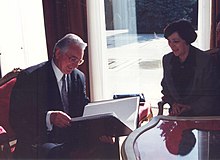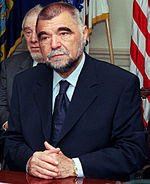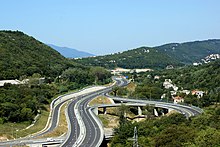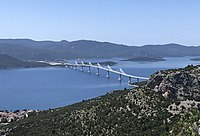History of Croatia (1995–present)
| History of Croatia |
|---|
 |
| Timeline |
|
|
This is the history of Croatia since the end of the Croatian War of Independence.
Tuđman: peacetime presidency (1995–1999)

In November 1995 the war in Croatia ended. Around 20,000 people were killed in the war, while official figures on wartime damage published in Croatia in 1996 specify 180,000 destroyed housing units, 25% of the Croatian economy destroyed, and US$27 billion of material damage.[1] Europe Review 2003/04 estimated the war damage at US$37 billion in damaged infrastructure, lost economic output, and refugee-related costs, while GDP dropped 21% in the period.[2] 15 percent of housing units and 2,423 cultural heritage structures, including 495 sacral structures, were destroyed or damaged.[3] The war imposed an additional economic burden of very high military expenditures. By 1994, as Croatia rapidly developed into a de facto war economy, the military consumed as much as 60 percent of total government spending.[4]
Following the end of the war,
As a result of the macro-stabilization programs, the negative growth of GDP during the early 1990s stopped and turned into a positive trend. Post-war reconstruction activity provided another impetus to growth. Consumer spending and private sector investments, both of which were postponed during the war, contributed to the growth in 1995-97 and improved economic conditions.[7] Real GDP growth in 1995 was 6,8%, in 1996 5,9% and in 1997 6,6%.[8]
In 1995 a Ministry of Privatization was established with Ivan Penić as its first minister.[9] Privatization in Croatia had barely begun when war broke out in 1991 and its transformation from a planned economy to a market economy was thus slow and unsteady. The ruling party was criticised for transferring enterprises to a group of privileged owners connected to the party.[10]
Croatia became a member of the Council of Europe on 6 November 1996. President of Croatia Franjo Tuđman won the 1997 presidential elections with 61.4% of the votes and was re-elected to a second five-year term. Marina Matulović-Dropulić became the Mayor of Zagreb having won the 1997 local elections, which formally ended the Zagreb crisis.
The remaining part of former
Value-added tax was introduced in 1998 and the central government budget was in surplus that year.[12] At the end of 1998 Croatia went into a recession and GDP growth slowed down to 1,9%. The recession continued throughout 1999 when GDP fell by 0,9%.[8] Unemployment increased from around 10% in 1996 and 1997 to 11,4% in 1998. By the end of 1999 it reached 13,6%. The country emerged from the recession in the 4th quarter of 1999.[13]
Račan government (2000–2003)

Tuđman died in 1999 and in the early
Economic growth picked up in 2000 following the recession.
The Račan government is often credited with bringing Croatia out of semi-isolation of the Tuđman era. Croatia became a
Sanader government (2003–2009)


In late 2003,
The country was given EU applicant status on 18 June 2004 and a negotiations framework was set up in March 2005. Actual negotiations began after the capture of general
In August 2007, Croatia experienced a tragedy when during the fires that ravaged its coast, 12 firemen died as a result of a fire on Kornat island.
Sanader was reelected in the closely contested 2007 parliamentary election.
The October 2008
In June 2009, Sanader abruptly resigned his post, leaving scarce explanation for his actions. As written by
Kosor government (2009–2011)

Jadranka Kosor assumed the head of the government following Sanader's resignation. Kosor continued with her predecessor's policy of integration into European Union[16] She also had to introduce austerity measures to counter the consequences of 2008 economic crisis and launched the anti-corruption campaign aimed at public officials.
Jadranka Kosor signed an agreement with
In the
Ivo Sanader tried to come back in
In June 2010, Kosor proposed loosening the labor law and making it more business friendly, in order to foster economic growth. The proposed new labour law would have set a six-month deadline for hammering out a new collective agreement after the existing one expires. After that, the workers' rights would be subject to separate agreements with individual employers instead.[24] The changing of the labour law was greatly opposed by five trade unions: a petition demanding a referendum gathered 813,016 signatures, far more than the required 449,506 signatures (10 percent of all voters in Croatia), in the first successful popular referendum attempt.[25][26][27]
Opinion polling was done for the prospective referendum: an Ipsos Puls for Nova TV poll of 8 July 2010[28] at a sample of 646 indicated 64% would support the referendum, 15% would be against, and 21% were undecided. CRO Demoskop also polled on the matter on 1 and 2 July[29] at a sample of 1300, and found 88.6% of the polled would support it.
After the Ministry of Administration completed its examination of the signatures, the Croatian Government first hinted that of all submitted signatures, no more than 330 thousand are valid, which would be insufficient for starting a referendum.[30] After a public backlash, they nevertheless passed the signatures on to the Parliament. The government then decided to withdraw the reform proposals on 3 September 2010.[31] The Croatian Parliament could not decide conclusively whether this rendered the referendum proposal moot or not, and instead passed the judgement on to the Constitutional Court of Croatia.[32] The court decided on 20 October 2010 that there was no longer any need to hold the referendum.[33] It ordered the government not to subject any changes to the labor law in the following year.
The government and labour unions later agreed that there would be a different referendum instead, asking the question "Do you agree that a referendum must be called if so requested by 200,000 registered voters, and that the time for the collection of the required number of voters' signatures should be 30 days?". It was planned to be held at the same time as the EU accession referendum,[34] but did not happen.
The 2011 Croatian protests were anti-government street protests in Croatia started on 22 February 2011,[35][36][37] after a call to protest over the Internet, and continued almost daily.[38] The protests brought together diverse political persuasions in response to recent government corruption scandals and worries regarding upcoming EU accession, and called for the resignation of Kosor and early elections. They were met by a violent police reaction and a ban on assembly in front of the Croatian Parliament in Zagreb.[39][40] On 26 February, tens of thousands of protesters met in the Croatian capital Zagreb's Ban Jelačić Square to express their support for indicted Croatian War of Independence veterans and demand for Kosor's government to resign.[41] Several dozen people were injured and arrested as anti-government protests degenerated into clashes with police.[41][42] In the following few weeks the number of protesters rose to some 10,000 people,[43] but later the protests gradually stopped.
On 30 June 2011 the EU accession agreement was concluded, giving Croatia the all-clear to join, with a projected accession date of 1 July 2013.[44]
Milanović government (2011–2016)

The
In January 2012, the new government organized a referendum for EU membership that passed with 66.27%. After the referendum, the Sabor ratified the accession treaty, the Treaty of Accession 2011.[45]
The Milanović cabinet endured a major change when the first deputy prime minister Radimir Čačić resigned in November 2012, having been convicted of vehicular manslaughter in Hungary.[46]
In the
Following the successful ratification of its accession treaty in all existing EU member states, Croatia joined the European Union on 1 July 2013.[48]
Shortly after joining the European union a question of extradition of Josip Perković arose. A member of Yugoslavian secret service UDBA, Germany accused Perković of murder of a Croat citizen Stjepan Đureković ( who is suspected to have stolen 200 million dollars from INA petrol company and has subsequently fled to Germany). At first Croatia was unwilling to extradite Perković under the justification that its constitution prohibited it ( all political crimes fall barred after 2002 ). However, when threatened with sanctions in case of non compliance, the parliament quickly voted to change the constitution to allow the extradition. Finally, the law is to come into effect on January the first 2014.[49]
On December the first 2013, Croatia held its third referendum since becoming independent. The referendum question was Do you define marriage as a union between a man and a woman, 65% of Croats voted yes, however, with a significantly low turnout of only 38% of eligible voters. The referendum was organized by the ultra-conservative group "In the name of family"'. The Catholic Church urged people to vote yes, while the government, 88 civil society organizations and local celebrities advised citizens to vote no. The referendum has raised much controversy and increase of violence against LGBT people in Croatian for this and following years.
The sixth
Late 2014 and first half of 2015 was also marked by prolonged
In 2015, after Hungary built a fence along its border with Serbia, over 17000 refugees crossed the border into Croatia. They are seeking an alternative route into the
In November 2015, the centre-right coalition, led by the Croatian Democratic Union (HDZ), won 59 seats while the ruling alliance, led by the Prime Minister Zoran Milanovic and his Social Democrats (SDP), won 56 seats in the parliamentary election. However, neither the ruling alliance nor the opposition got the parliamentary majority.[55]
Orešković government (2016)
In January 2016, Tihomir Orešković, a Canadian-educated economist and technocrat, became Croatian new Prime Minister.[56] Five months after taking the office, Prime Minister Orešković lost a parliamentary confidence vote, meaning his government fell.[57]
Plenković government (2016-)
In September 2016, the Croatian Democratic Union (HDZ) won the early parliamentary election. However, they were still short of a majority in the 151-seat parliament.[58] In October 2016, Croatian Democratic Union (HDZ) leader
In January 2020, former prime minister

The centre-right governing party HDZ won the
References
- ^ Darko Zubrinic. "Croatia within ex-Yugoslavia". Croatianhistory.net. Retrieved February 7, 2010.
- ^ Europe Review (2003), p. 75
- ^ Maja Sajler Garmaz (December 21, 1991). "Beskrajna obnova od rata" [Endless reconstruction after the war]. Vjesnik (in Croatian). Narodne Novine d.d. Retrieved January 20, 2011.
- ^ Commonwealth (1999), p. 280
- ^ a b "Krvava Noć vještica 1995.: Zašto je policija u Samoboru pokušala ubiti punk?". www.index.hr (in Croatian). Retrieved 2023-11-01.
- ^ "Jedanaest godina nezavisnosti Radija 101" at poslovni.hr
- ^ Istvan Benczes: Deficit and Debt in Transition: The Political Economy of Public Finances in Central and Eastern Europe, Central European University Press, 2014, p. 203
- ^ a b National Accounts Main Aggregates Database
- ^ William Bartlett: Europe's Troubled Region: Economic Development, Institutional Reform, and Social Welfare in the Western Balkans, Routledge, 2007, p. 18
- ^ William Bartlett: Europe's Troubled Region: Economic Development, Institutional Reform, and Social Welfare in the Western Balkans, Routledge, 2007, p. 66
- ISBN 978-1-139-48750-4.
- ^ OECD: Agricultural Policies in Emerging and Transition Economies 1999, p. 43
- ^ a b Istvan Benczes:Deficit and Debt in Transition: The Political Economy of Public Finances in Central and Eastern Europe, Central European University Press, 2014, p. 207
- ^ International Business Publications: Croatia Investment and Trade Laws and Regulations Handbook, p. 22
- ^ CIA Factbook - Croatia
- ^ a b c d e f "FELJTON: Kako je Hrvatska sasvim slučajno izbjegla autoritarizam". NACIONAL.HR (in Croatian). 2023-08-26. Retrieved 2023-08-26.
- ^ a b "Od splitske Rive do Vukovara: Ovo su najveći izlasci branitelja na ulice". tportal.hr. Retrieved 2023-08-26.
- ^ "Jutarnji list - Sanader i Gotovina: Zaštitnik postao progonitelj, a obojica završila u pritvoru". www.jutarnji.hr (in Croatian). 2011-04-16. Retrieved 2023-08-26.
- ^ a b "Croatia vows action against crime wave". ekathimerini. Reuters. 2008-10-07. Archived from the original on 26 October 2008. Retrieved 2008-10-23.
- ^ "Zagreb's Mayor Protects Fans, Punks Panic". Javno.hr. 2008-03-21. Archived from the original on 19 October 2008. Retrieved 2008-10-07.
- ^ "Suspect Confess to Attacking Luka Ritz". Javno.hr. 2008-10-22. Archived from the original on 26 October 2008. Retrieved 2008-10-23.
- ^ "Novi ministri Šimonović i Karamarko položili prisegu". Vijesti.net (in Croatian). 2008-10-10. Archived from the original on 13 October 2008. Retrieved 2008-10-23.
- ^ "Mafia Kills, But So Do Desperate, Jobless People". Javno.hr. 2009-02-06. Archived from the original on 2013-01-26. Retrieved 2009-02-23.
- ^ Croatian unions collect enough signatures for referendum
- ^ "Croat unions win right to referendum on labour law". Forexyard.com. 24 June 2010. Archived from the original on 11 July 2011. Retrieved 24 June 2010.
- ^ "Sindikati objavili: Imamo 720.078 potpisa za referendum!". Jutarnji list (in Croatian). 24 June 2010. Retrieved 24 June 2010.
- ^ "Za referendum o ZOR-u prikupljeno 813.016 potpisa". vecernji.hr (in Croatian). 1 July 2010. Retrieved 1 July 2010.
- ^ "Građani ipak ne znaju zašto su potpisali peticiju".
- ^ "Virtus dizajn".
- ^ Vlada ruši referendum o Zakonu o radu![permanent dead link] (in Croatian)
- ^ "Croatian government withdraws amendments to labour law (SETimes.com)". Archived from the original on 2010-09-18.
- ^ "Sabor: Ustavni sud odlučivat će o referendumu o ZOR-u". Jutarnji list (in Croatian). 2010-09-24. Retrieved 2010-09-25.
- ^ "Croatian Constitutional Court rejects holding referendum (SETimes.com)". Archived from the original on 2010-10-22.
- ^ "Croatian government, unions agree on referendum issue (SETimes.com)". Archived from the original on 2010-11-26.
- ^ Protest Movement Growing in Croatia, Antiwar.com
- msnbc.com[dead link]
- ^ Days of Rage in Croatia, Foreign Policy In Focus
- ^ "Internetom kruži poziv na prosvjed za rušenje Vlade: U utorak u 13 sati na Markovom trgu". Jutarnji List (in Croatian). 20 February 2011. Retrieved 16 March 2011.
- ^ M. Barukčić (22 February 2011). "Ni ovcama nije lako". H-Alter (in Croatian). Retrieved 16 March 2011.
- ^ M.K. (24 February 2011). "Suzavac na zagrebačkim ulicama". H-Alter (in Croatian). Retrieved 16 March 2011.
- ^ a b "Braniteljski prosvjed: Više stotina ljudi sa slikama Gotovine i transparentima okupiralo Trg – mJutarnji". Jutarnji.hr. Retrieved 24 April 2012.
- ^ "Clashes erupt in Croatian anti-government protests". Radio Netherlands Worldwide. ANP/AFP. 26 February 2011. Archived from the original on 2014-04-14. Retrieved 13 April 2014.
- ^ "1 mali, 2 mala, 10000 malih indijanaca!". MASA (in Croatian). 5 March 2011. Archived from the original on 2011-03-10. Retrieved 6 June 2011.
- ^ "EUROPA – Press Releases – EU closes accession negotiations with Croatia". Europa (web portal). 30 June 2011. Retrieved 24 April 2012.
- ^ "Croatians vote 'yes' to EU membership". France 24. 23 January 2012.
- ^ "U sjeni presude - Sabor potvrdio treću promjenu u Vladi: Žestoki sukob Lesara i Milanovića!". Jutarnji list (in Croatian). 2012-11-16. Archived from the original on 2016-03-03. Retrieved 2012-11-19.
- ^ Jureško-Kero, Jadranka (16 November 2012). "Damaška: Poručite generalima da sam presretan jer su na slobodi!". Večernji list (in Croatian). Retrieved 16 November 2012.
- ^ "Croatia celebrates on joining EU". BBC News. 30 June 2013.
- ^ "Croatian Ex-Spy Chief To Be Extradited". RadioFreeEurope/RadioLiberty.
- ^ "Tematska sjednica saborskog Odbora za ravnopravnost spolova – Suzbijanje nasilja nad LGBT osobama u Republici Hrvatskoj" (in Croatian). 23 October 2017. Retrieved 12 December 2017.
- ^ "Gay Campaigners Celebrate Victory in Croatia". 14 July 2014. Retrieved 12 December 2017.
- ^ "Grabar-Kitarovic elected Croatia's first woman president". BBC News. 11 January 2015.
- ^ "HOĆE LI 'DUG JEZIK' OPET KOŠTATI MILANOVIĆA? Zbog 'zoranizma' je već izgubio izbore 2016., a sada je konzistentan samo u jednoj stvari". Net.hr (in Croatian). 2019-11-18. Retrieved 2020-02-17.
- ^ "The European refugee crisis - the Croatian view | Heinrich Böll Stiftung | Brussels office - European Union". Heinrich-Böll-Stiftung.
- ^ "Croatia election: Opposition HDZ conservatives claim victory". BBC News. 9 November 2015.
- ^ "Prime Minister Orešković and His Croatian Government Take Power". www.total-croatia-news.com.
- ^ "Croatia government falls as PM loses no-confidence vote". www.aljazeera.com.
- ^ "Conservatives take lead in Croatia election". Reuters. 11 September 2016.
- ^ Welle (www.dw.com), Deutsche. "Croatian parliament approves new government | DW | 19.10.2016". DW.COM.
- ^ Lider/Hina (2017-10-07). "Agrokor: Kronologija krize koja trese naciju". lidermedia.hr (in Croatian). Retrieved 2022-07-28.
- ^ "Pogledajte što strani mediji pišu o otvaranju Pelješkog mosta: "Dodatno će izolirati BiH..."". Dnevnik.hr (in Croatian). Retrieved 2022-07-27.
- ^ Welle (www.dw.com), Deutsche. "Croatia election: Ex-leftist PM Zoran Milanovic wins | DW | 05.01.2020". DW.COM.
- ^ "Croatia's rightwing ruling party wins election victory". the Guardian. 6 July 2020.
- ^ Pešić, Milenko. "Desni ekstremizam problem tek kad zapuca i na Banske dvore". Politika Online. Retrieved 2022-07-27.
- ^ "Godinu od potresa u Petrinji i dalje ruševine". Radio Slobodna Evropa (in Serbo-Croatian). Retrieved 2022-07-27.
- ^ "Petrinja je neprepoznatljiva, razoran potres uništio grad". Portal53 (in Croatian). 2020-12-30. Retrieved 2022-07-27.
- ^ "Jutarnji list - Broj zaraženih koronavirusom u značajnom porastu, ali bolnice se ne pune jer je bolest najčešće blaža". www.jutarnji.hr (in Croatian). 2022-07-09. Retrieved 2022-07-27.
- ^ "Dron koji je pao u Zagrebu izvučen iz zemlje, slijedi analiza". tportal.hr. Retrieved 2022-07-27.
- ^ "Jutarnji list - Svi detalji otvorenja: Rimčeva Nevera prva će prijeći most koji se ipak neće zvati kako se mislilo". www.jutarnji.hr (in Croatian). 2022-07-16. Retrieved 2022-07-27.
- ^ "Objavljeni konačni rezultati Popisa 2021". template.gov.hr. Retrieved 2023-01-03.
- ^ "VIDEO Ludi doček vatrenih na Trgu uz 80 tisuća ljudi, igrači obećali zlato. Dalić: To je Hrvatska naših snova". www.vecernji.hr (in Croatian). Retrieved 2023-01-03.
- ^ "Ulaskom u Schengen i eurozonu prvog dana nove godine Hrvatska otvorila novo poglavlje". Hrvatska radiotelevizija. Retrieved 2023-01-03.
